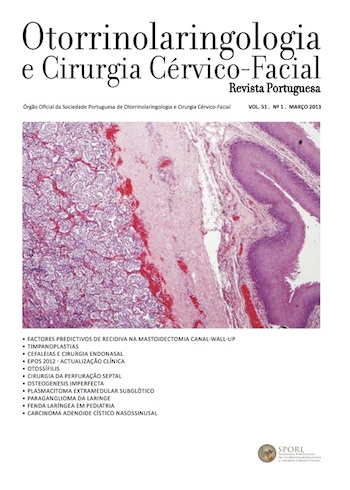Canal wall-up mastoidectomy - Predictive factors of recurrence
DOI:
https://doi.org/10.34631/sporl.2Keywords:
cholesteatoma, canal wall-up, canal wall-down, mastoidectomy, recurrence, computed tomography scan, second look surgeryAbstract
Canal wall-up timpanoplasty is increasing its popularity as the preferred treatment for cholesteatoma. Nevertheless, the significant recurrence rate of this disease turns the choice for surgical treatment controversial and difficult. Aiming to analyze tympanomastoidectomy success rate in Hospital São José’s Otolaryngology Department, to establish eventual predictive factors for failure and to evaluate the computed tomography scan’s value in the study of this pathology, we present a retrospective study since 2005 to 2009. Some factors were identified as related to failure, such as the presence of cholesteatoma in the sinus tympani, the scutum erosion and the large extension of initial disease. The computed tomography scan presented a limited value in the diagnosis and evaluation of the disease, especially in post-operative patients. In the absence of more accurate diagnostic procedures, we recommend the second look surgery as the most precise instrument in controlling cholesteatoma’s recurrence.
Downloads
References
Fleury P, Legent F, Bobin S, Basset JM, et al.. Otite chronique cholestéatomateuse. Aspects cliniques et indications thérapeutiques. In: Encycl Méd Chir, Oto-rhino-laryngologie, Paris, Elsevier. 1989; 20095 A20: pp1-14.
Roland PS. Middle Ear, Cholesteatoma. 2009. http://emedecine.medscape.com/article/860080-overview Acedido em Fevereiro 1, 2011.
Sculerati N, Bluestone C. Pathogenesis of cholesteatoma. Otolaryngol Clin North Am. 1989 Oct; 22(5): 859-68.
Ferlito O, Devaney KO, Rinaldo A, Milroy C, et al.. Clinicopathological consultation ear cholesteatoma versus cholesterol granuloma. Ann Otol Rhinol Laryngol. 1997 Mar; 106:79-85.
Instituto Nacional de Estatística. População de Portugal. www.ine.pt. Acedido em Março 27, 2011.
Costa C, Lopes S. Avaliação do desempenho dos hospitais públicos em Portugal Continental. 2007 Jan. http://www.ensp.unl.pt/investdesenvolv-
inov/projectos/adhp_versaofinal_31jan07.pdf, Acedido em Mar 27, 2011.
Kang MK, Ahn JK, Gu TW, Han CS. Epitympanoplasty with mastoid obliteration technique: a long-term study of results. Otolaryngol Head Neck Surg. 2009 May; 140(5): 687-691.
Stankovic MD. Audiologic results of surgery for cholesteatoma: short and long-term follow-up of influential factors. Otol Neurol. 2008 Oct; 29(7): 933-940.
Kaylie DM, Gardner EK, Jakson CG. Revision chronic ear surgery. Otolaryngol Head Neck Surg. 2006 Mar; 134(3):443-450.
Chadha NK, Jardine A, Owens D, Gillet S, et al.. A multivariate analysis of the factors predicting hearing outcome after surgery for
cholesteatoma in children. J Laryngol Otol. 2006 Nov; 120(11): 908-913.
Zinis LO, Tonni D, Barezzani MG. Single-stage canal wall-down tympanoplasty: long-term results and prognostic factors. Ann Otol
Rhinol Laryngol. 2010 May; 119(5):304-312.
Cho YS, Hong SD, Chung KW, Hong SH, et al.. Revision surgery for chronic otitis media: characteristics and outcomes in comparison with primary surgery. Auris Nasus Larynx. 2010 Feb; 37(1): 18-22.
Ho SY, Kveton JF. Efficacy of the 2-staged procedure in the management of cholesteatoma. Arch Otolaryngol Head Neck Surg.
May; 129(5):541-545.
Presutti L, Marchioni D, Mattioli F, Villari D, et al.. Endoscopic Management of acquired cholesteatoma: our experience. J Otolaryngol Head Neck Surg. 2008 Aug; 37(4):481-487.






